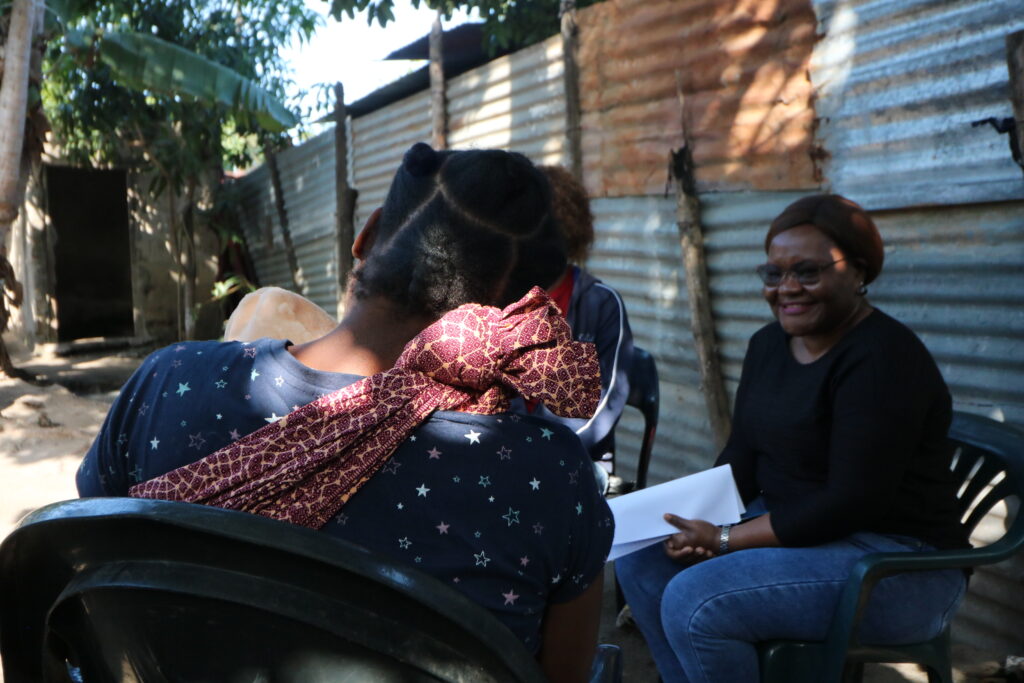
Always smiling and cheerful, Carla Santos Cossa*, a mentor mother since 2019, pays attention to women waiting for appointments as she walks through the corridors of the Integrated Care and Treatment Center (CICTRA) at the Military Hospital of Maputo. She begins her day at the health center like many other mentor mothers across Mozambique.
“In the morning, we start the day with health talks. I specifically deal with pregnant women living with HIV during prenatal consultations. I provide counseling based on my own experience with antiretroviral therapy [ART] follow-up,” said Carla, 37. “I talk a lot about the importance of taking medication, controlling viral load, breastfeeding, and all postpartum care to ensure that the child is born and remains HIV-free.”
Across Mozambique, in military health centers, there are about 80 mentor mothers—mothers living with HIV who work with women to provide them with the chance to give birth to HIV-free children. They play a crucial role in patient retention by providing emotional support, practical guidance, and inspiration for women who have just learned that they tested positive for HIV.
With technical support from Jhpiego and funding from the U.S. President’s Emergency Plan for AIDS Relief, through the United States Department of Defense, mentor mothers have supported over 4,853 pregnant and breastfeeding women living with HIV since 2018 through the Mozambican Armed Forces health centers.
Often, when women learn about their serostatus [HIV status], they can be scared. It’s natural, but as a mentor mother, I have to help this woman make the right decisions for the child’s future. I am a living example because I have a son who will turn one next month and he lives free from HIV.”
Carla from Mozambique
“When you use your own story to encourage other women, it works better,” she adds. “They look at you and see a healthy person who takes care of themselves, and they realize that it is possible to move forward in good health with a future.”
Carla’s tasks are not limited to the military health centers; she and other mentor mothers visit thousands of women who are on ART.
“In our work, we make many home visits,” said Carla “They are usually preventive visits or reintegration, or when our patients don’t feel well. We often establish strong relationships with our patients, and they end up treating us like godmothers. The friendship between us and our patients is so healthy that sometimes they visit our homes.
It’s one of the most wonderful things about our work. Being able to help other women continue with their treatment, see healthy children come into the world, and establish that sense of familiarity with people we didn’t know.”
Carla from Mozambique
Sónia Amaral, a 32-year old who lives on the outskirts of Maputo, received help and support through the mentor mothers . It was 2018, and Sónia became a mother for the second time.
“My baby was constantly sick with fevers and constant diarrhea. At the time, a neighbor, seeing our constant suffering, recommended that I take my daughter for consultations at the health center of the Mozambican Armed Forces located at Mavalane Air Base,” Sónia said.
“When I arrived at the health center and explained what was happening, they decided to test me and the baby and discovered that both of us had HIV. It was a difficult moment because I couldn’t understand how this happened since when I had this baby, we were tested, and we were HIV-negative. I was in tears.”
The hospital team sat with Sónia and asked about the baby’s father to try and identify the transmission of the virus.
“The baby’s father abandoned me while I was still pregnant, and after having my baby, I met another man with whom I started living,” Sónia explained. “They asked me to have a conversation with my partner to find out if he knew his serostatus. He was on antiretroviral treatment and didn’t tell me anything. As a result, I infected my daughter through breastfeeding.”
Mentor mothers provided Sónia with daily encouragement for acceptance of her HIV status, emotional stability, and retention in care and treatment for both Sónia and the baby. Today, thanks to their support, Sónia remains on treatment and now has two more daughters who are living free of HIV.
“I advise all women in my situation to continue with treatment and follow all the recommendations given by the mentor mothers who support us,” said Sónia. “It has been a great help to have someone who listens to us and supports us with our questions. Anything related to health, you just pick up the phone, call them, and they are always available to listen and support us.”
Mentor mothers are indeed changing lives and providing a healthier future for countless families in Mozambique.
*Carla Santos Cossa is a pseudonym chosen at the request of our mentor mother to protect her privacy.
Manuel Jesus Joaquim is the Senior Communications Associate in Jhpiego’s Mozambique office. Editor Elizabeth Thompson and Indrani Kashyap, Associated Director, of Regional Communications for Jhpiego, both contributed to the writing of this article.



